カリキュラム
国際実務英語
開催日程・場所 受講者 / プログラム概要 / 全体講義 / 分科会 / レポート提出
合宿セミナーの様子
2013年国際キャリア開発プログラムの「国際実務英語」合宿セミナーが、2013年9月21日(土)~9月23日(月)に栃木県青年会館コンセーレで開講されました。
今回のセミナーでは、宇都宮大学の学部生・院生18名、他大学生5名、社会人4名の総勢27名の参加となりました。
セミナー期間中は、全て英語での授業となりましたが、参加者は、言葉の壁を物ともせず、第一線で活躍されている豊富な経験を有する講師とともに、働くとは何か、そして仕事と地域や世界とのつながりについて考え、実践的な英語で活発に発言・意見交換を行っていました。それぞれの目標に向かい努力を重ね、国際キャリアに関する理解を深めることができ、無事に全員がセミナーを修了することができました。
参加者からは、「普通の英語学習ではとても得られないもの、社会人や年上の方との共同作業の経験はとても貴重だった。」、「英語で意見交換ができ良かった。」、「分野が多岐に渡って興味深かった。」、「専門用語を使った議論は普段の生活ではめったになく、非常に有益な機会であった。」と、多くの建設的な意見が寄せられました。
来年度も、開催を予定しておりますので、グローバル時代のビジネス、国際協力、多文化共生、異文化間コミュニケーションに関心を持ち、将来、国際的な問題に対応する職場や海外で働いてみたいと考える皆さん、是非、ご参加ください。多くの方のご参加をお待ちしています。

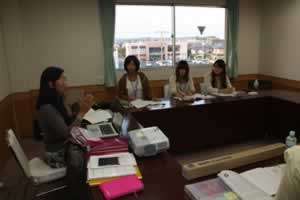
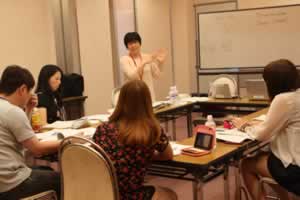
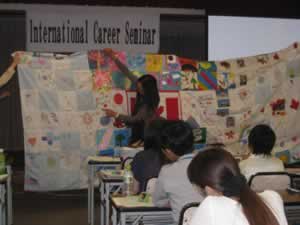
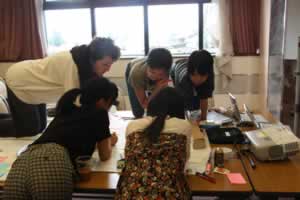
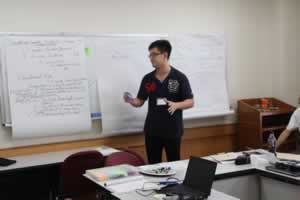
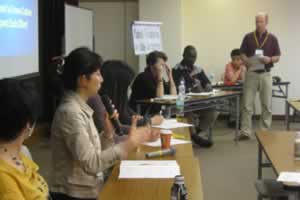
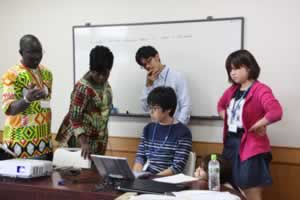
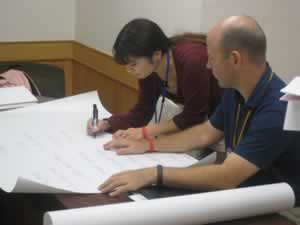
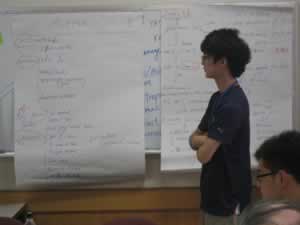
開催日程・場所
日程:2013年9月21日(土)~9月23日(月) 2泊3日
住所:栃木県宇都宮市駒生1丁目1番6号
※「コンセーレ (栃木県青年会館)」に集合して下さい。
(JR宇都宮駅西口からバスで15分程度 アクセスマップ)
受講者
対象者:栃木県内外の大学生や青年
定 員:50名(先着順)
参加費:10,000円(宿泊費、食費込)
<注意事項>
既に行われた「国際実務英語Ⅰ」「国際実務英語Ⅱ」を履修し単位を取得した宇都宮大学の学生は、今回履修しても単位が重複して付与されることはありません。
プログラム概要(予定)
<1日目> 9月21日 土曜日
9:00~ 9:30 受付
9:30~ 9:45 開講式/オリエンテーション
9:50~12:00 全体講義/ワークショップ
12:00~13:00 昼食
13:00~13:20 趣旨説明/分科会発表のプレゼン方法説明
13:20~14:30 分科会講師の講義(1人10分)
15:00~16:30 パネルトーク
16:50~17:50 分科会 参加者は分科会を一つ選択します。
18:00~18:20 チェックイン
18:30~20:00 夕食/交流会
<2日目> 9月22日 日曜日
7:30~ 8:20 朝食
8:30~12:00 分科会
12:00~13:00 昼食/記念撮影(集合写真)
13:00~15:30 分科会
15:30~17:30 分科会まとめ/中間発表準備
17:30~18:30 中間発表
18:30~19:30 夕食
19:30~21:30 発表準備(自由)
<3日目> 9月23日 月曜日
7:30~ 8:20 朝食
9:00~10:00 発表準備
10:00~12:20 全体発表(発表10分、質疑応答5分、講評5分)
12:20~13:20 昼食
13:20~14:50 振り返り/意見交換/全体総括/アンケート記入 等
15:00~15:15 閉講式
15:30~ バスで宇都宮大学・宇都宮駅に移動・解散(現地解散も可)
全体講義
Local Challenges for Global Success
講師:ライマン アンドリュー
Andrew Reimann 氏 (宇都宮大学国際学部 准教授
Associate Professor, International Department, Utsunomiya University)
What are the most important skills needed to be successful in today’s world? Globalization offers opportunities for visionaries and those able to challenge new ideas. Success in this rapidly changing world requires being able to adapt, predict, improvise and pioneer new ideas while challenging old ones. At the core of this skill set is an awareness, understanding and acceptance that differences, risk or uncertainty are not obstacles but resources.
<プロフィール>
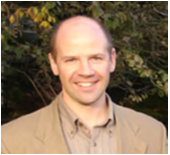 Andrew Reimann is from Vancouver, Canada and has a Ph.D. in Applied Linguistics from Macquarie University.
Andrew Reimann is from Vancouver, Canada and has a Ph.D. in Applied Linguistics from Macquarie University.
He teaches classes on Comparative Culture Studies and Intercultural Communication. His research interests include raising cultural awareness and communication strategies.
His recent publications include; Context, Culture and Communication, Culture Studies Handbook and Raising Cultural Awareness as part of EFL Teaching in Japan.
分科会
参加者は分科会を一つ選択します。
分科会A:Who Is a Community Leader?
What Is Required from a Field Worker?
講師:アパウ ベルナルド ティモシー
Bernard Timothy Appau 氏 (学校法人アジア学院 講師、 宣教師
Missionary Chaplain, ARI Asian Rural Institute)
The character of a leader is very important in community development, a community leader should be someone humble, action oriented, good mobilizer and whom his or her community understands and respects him/her. It should be a person who have the spirit of a servant leader
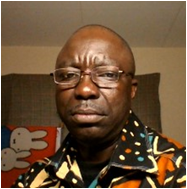 <プロフィール>
<プロフィール>
Bernard Timothy Appau is from Ghana. He has studied agriculture in the
Philippines, and Asian Rural Institute (ARI) in Tochigi, Japan.
He teaches
and practices organic agriculture and community development in the Institute
to train leaders from different countries. He has also worked for
development projects including food aid to refugees from Ivory Coast in
Ghana and distributed free treated mosquito nets to pregnant women and
children under 5 years old as part of his involvement in the Christian
Ministry.
分科会B:Thinking Through Walls
講師:モリソン バーバラ
Barbara S. Morrison 氏 (宇都宮大学国際学部 講師
Assistant Professor, International Department, Utsunomiya University)
In this work group session we will be using the field of cultural studies as a means to think through differences of thinking; in this case, differences which create barriers that prevent understanding and inhibit, if not prevent, international resolutions to important issues.
<プロフィール>
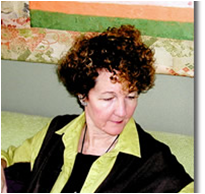 In the International Department at Utsunomiya University I teach Cultural Studies – a relatively new field that was established in Scotland in the 1960’s and grew out of a Marxist perspective. Cultural Studies shows us how we can think through cultural differences in productive and meaningful ways.
In the International Department at Utsunomiya University I teach Cultural Studies – a relatively new field that was established in Scotland in the 1960’s and grew out of a Marxist perspective. Cultural Studies shows us how we can think through cultural differences in productive and meaningful ways.
During this seminar we will be using the type of thinking characteristic of Cultural Studies so that we can skilfully manage the demands of a global society.
分科会C:Second Generation of South Americans in Japan: Building Professional Careers
講師:スエヨシ アナ
Ana Sueyoshi 氏 (宇都宮大学国際学部 講師
Department of Social Studies, Faculty of International Studies, Utsunomiya University)
In spite of being stigmatized as academic underachievers, a conspicuous but unfortunately still limited second generation of South Americans are building their professional careers in Japan or in their homeland. The discussion will be focused on the determinant factors for overcoming academic adversity, the role of bi-culture on their career paths, parental and institutional support, among others.
<プロフィール>
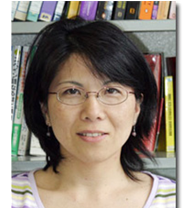 Economic Advisor for the United Nations Development Program(UNDP)(1992-1993), Economic Advisor on Public Policy at the Ministry of Finance of the Government of Peru (1993-1997). Since 2006 teaches courses of Latin American Studies at the Faculty of International Studies, Utsunomiya University, Japan. She obtained her Master of Philosophy in Economic Development and Policy Management, and pursued doctoral studies at the Graduate School of International Political Economy (GSIPE), Tsukuba University, Japan. Her research has been focused on endogenous growth models and fiscal policy in Latin American countries, role of the state and neo-liberalism, and education of Peruvian returnee children after being in Japan.
Economic Advisor for the United Nations Development Program(UNDP)(1992-1993), Economic Advisor on Public Policy at the Ministry of Finance of the Government of Peru (1993-1997). Since 2006 teaches courses of Latin American Studies at the Faculty of International Studies, Utsunomiya University, Japan. She obtained her Master of Philosophy in Economic Development and Policy Management, and pursued doctoral studies at the Graduate School of International Political Economy (GSIPE), Tsukuba University, Japan. Her research has been focused on endogenous growth models and fiscal policy in Latin American countries, role of the state and neo-liberalism, and education of Peruvian returnee children after being in Japan.
分科会D:Global Responsibility and Building Bridges between Countries and Cultures
講師:オオハマ リンダ
Linda Ohama 氏 (日系三世の映画監督、作家、ヴィジュアル・アーティスト
Japanese Canadian sansei film director and educator)
From my own path, address the issues of global responsibility, networking, and work and living practises. How to start building ties between countries and cultures. How to prepare to fill a role and make a difference on the international stage through education, work, and volunteerism.
<プロフィール>
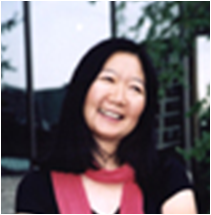 Nikkei Canadian sansei, Linda Ohama, is a documentary filmmaker, visual artist, writer, and educator, who has been working in film for over 20 years. Her documentaries have been screened in the US, Canada, Europe, and Asia and received numerous awards. Since March 2011, Linda has been involved in volunteering and support for Tohoku, Japan.
Nikkei Canadian sansei, Linda Ohama, is a documentary filmmaker, visual artist, writer, and educator, who has been working in film for over 20 years. Her documentaries have been screened in the US, Canada, Europe, and Asia and received numerous awards. Since March 2011, Linda has been involved in volunteering and support for Tohoku, Japan.
分科会E:Building Mutual-Trust in Global Business
講師:中川 有紀子
Yukiko Nakagawa 氏 ((株)ワコム グローバル人事マネージャー
Wacom Co., ltd. Global Human Resources Manager)
Regardless of Japanese capital or foreign capital, companies have to survive global competition under the borderless market. When you got the opportunities to participate or lead the project across countries, what kind of mind-set and skills you need?
<プロフィール>
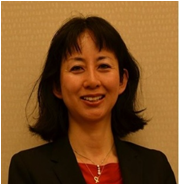 B.A. from Osaka University, school of foreign studies. Human Resources Management career at Mitsui Trust Bank , US Nomura Securities International, GE (General Electric) Japan HR manager.
Ph.D. candidate of Keio University, Commerce of faculty, Phd School. Research fellow of Economic Observatory, Keio University .Visiting researcher of Institute for Transnational Human Resource Management ,Waseda University. Part-time lector at International Business Communications, Takusyoku University. Foreign visiting lector at Yon-Sei University (Korea) ,Business School. Volunteer English teacher of NPO “Let’s Talk Foundation” to support Rikuzen Takada.
B.A. from Osaka University, school of foreign studies. Human Resources Management career at Mitsui Trust Bank , US Nomura Securities International, GE (General Electric) Japan HR manager.
Ph.D. candidate of Keio University, Commerce of faculty, Phd School. Research fellow of Economic Observatory, Keio University .Visiting researcher of Institute for Transnational Human Resource Management ,Waseda University. Part-time lector at International Business Communications, Takusyoku University. Foreign visiting lector at Yon-Sei University (Korea) ,Business School. Volunteer English teacher of NPO “Let’s Talk Foundation” to support Rikuzen Takada.
分科会F:How to Change Japan into a Refugee-Friendly Country
講師:根本 かおる
Kaoru Nemoto 氏 (元国連難民高等弁務官事務所(UNHCR)職員、ジャーナリスト
Independent Journalist)
Japan is a signatory to the Refugee Convention and has supported the work of UNHCR or UN Refugee Agency as the second-largest donor country. However, Japan has failed to offer asylum to those who ask protection. The participants will examine the role of different actors and design a strategy for change.
<プロフィール>
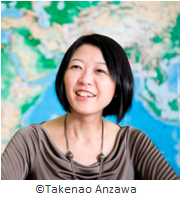 After graduating from the Faculty of Law at University of Tokyo, Ms. Nemoto worked as an announcer and reporter at TV Asahi Corporation. She joined UNHCR after graduating from the School of International and Public Affairs, Columbia University, where she earned master’s degree as a Fulbright scholar. Currently Ms. Nemoto works as an independent journalist and serves as a member of the board of directors of the Japan Association for UNHCR. She has released three books on refugees and writes on human rights and humanitarian issues in various media.
After graduating from the Faculty of Law at University of Tokyo, Ms. Nemoto worked as an announcer and reporter at TV Asahi Corporation. She joined UNHCR after graduating from the School of International and Public Affairs, Columbia University, where she earned master’s degree as a Fulbright scholar. Currently Ms. Nemoto works as an independent journalist and serves as a member of the board of directors of the Japan Association for UNHCR. She has released three books on refugees and writes on human rights and humanitarian issues in various media.
<追加文献>
http://www.unhcr.org/509a836e9.html
http://www.unhcr.or.jp/protect/pdf/IndoChineseReport.pdf
レポートの提出について
宇都宮大学等で履修登録をしている学生はレポートの提出が必要となります。
40% participation and presentation 60% report and submission of text. Those who need credit from this seminar are asked to complete all the worksheets and submit the text to the report box of Nanako SHIMIZU (Faculty of International Studies, A-building, 1st floor) by 17:00, Tuesday, October 1st. It is also possible to fill in the downloaded file of the text from this page and submit the printed version.
